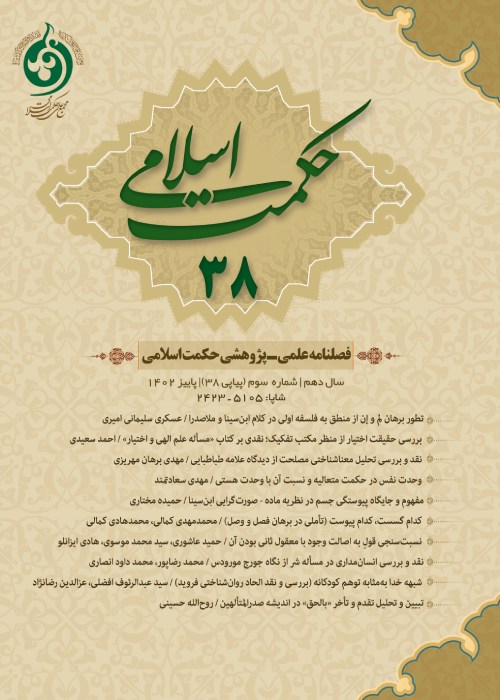The Standard for the Existential Differentiation between the Faculties of Understanding and its Effect upon the Existential Nature of the Human Faculty of Wahm According to Ibn Sina and Mulla Sadra
An analysis of the philosophical teachings of Ibn Sina and Mulla Sadra show us that in these two philosophical schools of thought, the faculty of wahm was never rejected as a secondary source for the actions and conceptions of the soul. Rather, in the philosophy of Ibn Sina, this faculty was like the other faculties of knowledge of man, i. e. it was an independent faculty distinct from the others.
However, in the philosophy of Mulla Sadra, this faculty does not have an independent existence and it resembles a ‘fallen intellect’ that has descended from its original station and that has turned towards the imaginative and sensible forms. Therefore, the faculty of wahm is like the intellect in that it is intellectual in nature and has achieved a level of intellectual immateriality. So, there is no existential distinction between them. In this philosophical system, each one of the categories of the realm of existence has its own degree of existential intensity or weakness. The pure intellect falls at the highest degree of the realm of intellection and the faculty of wahm, i. e. the lower intellect, can be found at the lowest level of this realm. It seems that the various standards by means of which the existential multiplicity of the external beings has been applied to the problem of the existential distinctions of the faculties of knowledge that are situated in a vertical hierarchy with one another. This has led to different views regarding the nature of the existence of the faculty of wahm. This is because Ibn Sina understands the existential difference between the faculties of understanding of man to lie in the personal accidents that lie outside of the essence and quiddity [of these faculties]. He was of the belief that human beings are classes of one reality and quiddity that are different from one another in their locus and the specific actions of understanding. Mulla Sadra however, does not believe that their distinction lies in material accidents, since he believes in the immateriality of all of the faculties of understanding. Rather, based upon the theories of the principality of existence, gradation in existence and the unity of knowledge, the knower and the known he was of the belief that the faculties of understanding that form a vertical hierarchy with one another become individual and distinct from one another due to their unity with the higher beings of quiddity.
- حق عضویت دریافتی صرف حمایت از نشریات عضو و نگهداری، تکمیل و توسعه مگیران میشود.
- پرداخت حق اشتراک و دانلود مقالات اجازه بازنشر آن در سایر رسانههای چاپی و دیجیتال را به کاربر نمیدهد.


